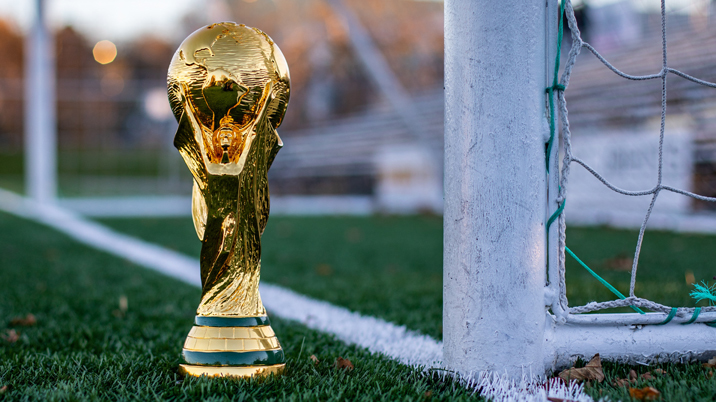
The World Cup: conflicting emotions
Football crazy
I love football. In my early teens, my dad would despair. I’d amble up and start a conversation about a crossword clue, cookery (he was a chef), the weather. And within 30 seconds I’d have turned it round to football, asking him about the Busby Babes, about Highbury and White Hart Lane – back in the day, he had been involved in the boardroom catering for both Arsenal and Spurs, alternating with their home games.
But the only professional football I could watch (too young to go alone, parents too busy running a restaurant to take me) was 45 minutes of edited highlights on a Saturday night and the FA Cup Final. “They can’t show any more or people wouldn’t go to the games,” Dad explained.
But then we were about to host the World Cup and there was more to see. I became even more obsessed. And then we won. Football dominated my life and I determined, at the age of 14, to make it my life. Oh the certainties of youth.
I couldn’t play. I couldn’t referee. I couldn’t be involved in admin. All these things were barred to women in those days. But maybe I could write about it. I’d become a sports reporter. I looked into journalism as a career and discovered it was one of the few occupations that had had equal pay and, supposedly, opportunities for women since before universal suffrage. In theory anyway.
I went to the local paper to ask about employment prospects. Looking back, it was very kind of the editor to give time to this young girl still two years away from O-levels. I told him of my ambition, he sat back in his chair, smiled and picked up the phone. I remember his words clearly to this day. “Come through here for a minute Reg. I’ve got a strange bird here I’d like you to meet.” (He was definitely using the term ‘bird’ in the ornithological rather than derogatory ‘dolly bird’ sense.)
When the sports editor appeared and heard what I wanted to do, he paused for a minute before pronouncing: “Oh no. You couldn’t do that. I don’t think the Reds (the local Athenian League side) even let women into the press box. You’d have to do it from the touchline. No. It wouldn’t do at all.”
The editor was not so dismissive of my prospects. He told me, though, that I couldn’t just be a football reporter. I had to learn to be a news reporter first and then specialise once I’d qualified. He explained to me how to go about doing that. I followed his advice and the rest is history. Except I never did get to be a football reporter – once I discovered news, I was hooked for life.
So why this trip down memory lane? Well, I think it’s a nice story. And to show that I understand the preoccupation with the sport. It was the very thing that made me choose my career. But even at my most obsessive, I never for a moment thought that anything I wrote would make page one. Winning the World Cup was a one-off event; football belonged at the back.
Now, it’s never off the front.
Should we even be there?
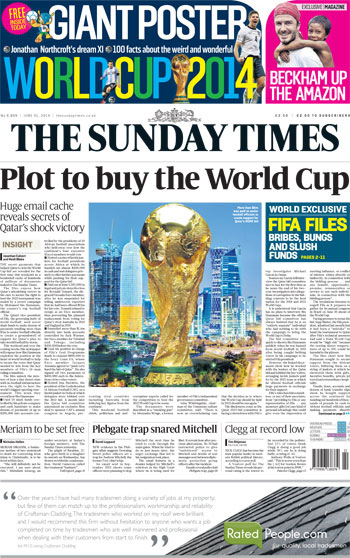
There’s certainly a lot to say about this World Cup – and has been ever since the tournament was awarded to Qatar at the end of 2010. The Sunday Times was at the head of the field with evidence of Fifa corruption and has been on the case with seriously good work ever since; the Guardian has been relentless in focusing on the treatment of, and the alarming death toll among, the workers building the infrastructure. On both papers, investigative reporters and senior sports staff have worked together to produce important, compelling journalism. These have been the stand-out newspapers.
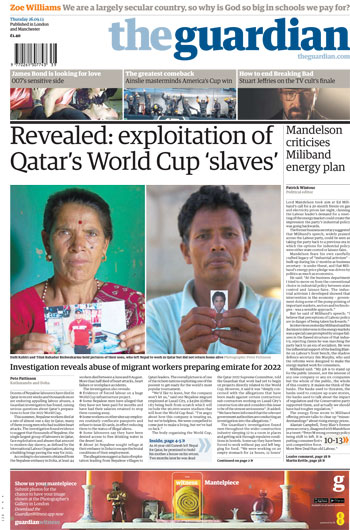
Others have dipped in and out of the question of human rights and equality, but have preferred to focus on the football. Would the home nations qualify? Who would be in the squads? Not ‘Should we be going there at all?’
In March 2018, after the Salisbury poisonings, the Daily Mail ran three front pages posing that very question about the Moscow-hosted finals due to take place in June. I remember thinking they showed how out of touch the paper was. Did it seriously think we’d pull the plug on going? We didn’t, of course. And when we got to the semi-final, the Mail was there with all the rest, crying ‘Come on England’ on the front (once actually above a splash headline that said ‘Murdered by novichok’) and then saying ‘Never mind, you did your best’ when we lost to Croatia.
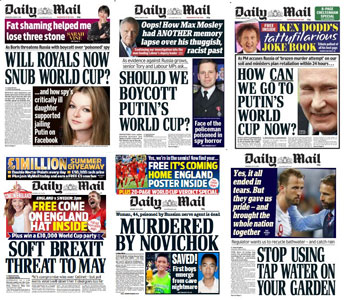
But I was wrong, the Mail was right to ask the question. Even if the answer was a foregone conclusion.
This time, hardly anyone bothered asking it – certainly not on their front covers. But now the competition has started, the controversies keep bubbling up as the off-pitch goalposts are moved almost daily. First there’d be beer, then there wouldn’t. First there’d be rainbow armbands, then there wouldn’t. What was David Beckham thinking of, promoting this country? Would Joe Lycett really shred £10,000? How could the two Garys – Lineker and Neville – square going out there to earn gazillions commentating with their previous stances on human rights and equality issues? It’s all such a muddle.
But, hey! Football. It’s all about the football, we keep telling ourselves. Let’s focus on the sport, not on the background – we can sort of tell that story by asking the fans about their experience. But isn’t that a bit, well, uncomfortable? Take these two front pages. The Guardian is concerned for workers paid a pittance (don’t forget this is a humungously rich country), the Mail for fans being denied beer. Meanwhile both try to use the competition to lure in the casual reader with their giant ‘World Cup special’ Saturday puffs.
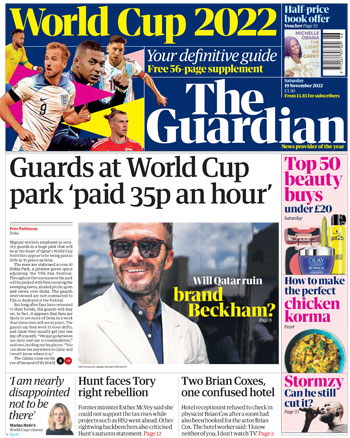
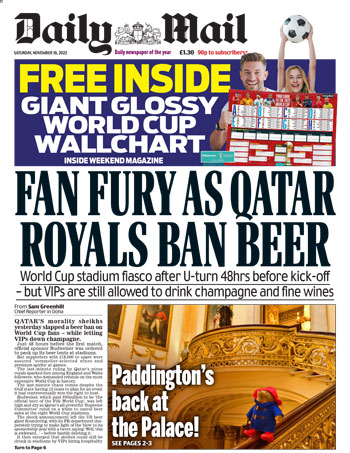
And look again at that award-winning Sunday Times corruption splash from June 2014. Perfectly timed to coincide with the start of that year’s competition, even that page was touting a free giant poster and a magazine feature on Beckham in Brazil.
Flag waving
On Monday, with England and Wales about to play their first games, there was Harry Kane with his flag, and on Tuesday there was more delight at the 6-2 win and Wales’s commendable point against the USA.
We’ve come to expect this from the tabloids. But from the BBC? On Monday night, the Ten O’clock News lead story was England beating Iran. Coverage lasted for nearly half the bulletin: the anthems and the Iranian players’ silence, the game, the fans, and then on to the Wales match and Huw Edwards being ‘very calm’.
Yes, it was the most up-to-date event. But other things were happening in the world, too. Like an earthquake in Indonesia, the ongoing political and economic turmoil here, a war in Ukraine, the deputy prime minister facing a bullying inquiry. Some of these were mentioned, others ignored, before it was ‘Back to our main story’ and another three minutes of fans watching the football from pubs in England and Wales. ‘Our main story’? The most important issue of the day is people watching the television and jumping for joy? Where is the sense of proportion? Couldn’t even those three minutes be used to tell us something else, something different, something new? At least newspapers offer a wider menu on their inside pages.
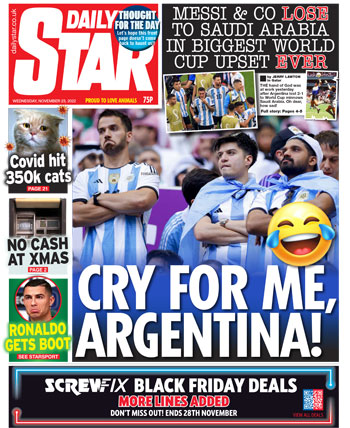
But back to the press coverage. Yesterday, we had Messi’s Argentina humbled by Saudi Arabia – described in the Star splash as the “biggest World Cup upset ever” – and the predictable crying puns. What was maybe less predictable was that the Guardian should give over half of page one to the game, that the Times would make it the main picture and that the Express and Mail should puff it – while it was absent from a Mirror front that had three footballing elements.
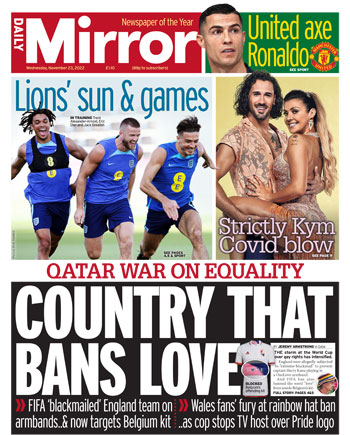
The Mirror had a picture of England players in training and a little bit of Ronaldo (more of him later), but it splashed on ‘Country that bans love’, bringing together a clutch of Qatar equality issues: the Fifa ‘Onelove’ ban, the Welsh fan told to take off his rainbow hat and a Danish journalist told, mid-commentary, by a policeman to remove an armband. He didn’t and the broadcast went ahead anyway.
On Tuesday, Metro had a huge picture to celebrate England’s win – but its splash, Bravery of lions, was the Iranian players’ anthem protest.
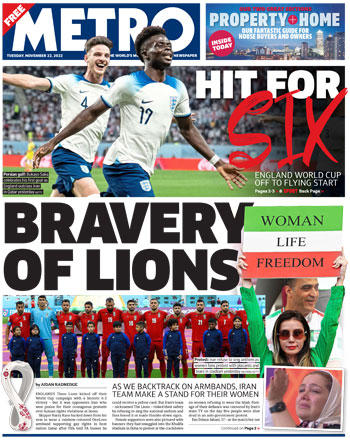
So yes, it jars. And yes, the more we see, the more we wonder whether we should be there at all. But our footballers’ presence means the press pack are there too. And that is how – very belatedly – awkward questions are being raised. And not just in Britain. This may yet turn into the reverse of sportswashing. No wonder some ruling Qataris are reportedly regretting ever bidding for the competition in the first place.
Enough rope
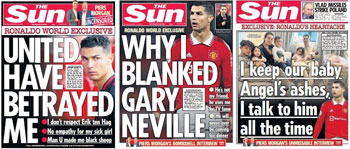
And then there was Ronaldo. If I had been a betting woman (which I’m definitely not; see below), I’d have wagered a few bob on his departure from Manchester United making the splash for the Sun yesterday. After all, it was largely thanks to the Sun – and its owners News UK – that his Old Trafford career was terminated. He had offered his friend Piers Morgan a ‘big interview’, which he used to say that he had no respect for the manager. Hardly the sort of sentiment someone expresses publicly if they hope or intend to continue in their current employment.
The interview for Morgan’s (News UK-owned) TalkTV show was served up in bitesize pieces across three days in the Sun (for which Morgan also writes a column) at the beginning of last week, starting with “United have betrayed me”. One wonders what took the club so long to boot him out. The paper got three splashes, three spreads and two back pages out of the interview. The Sun headlines appear sympathetic – “United doubted me over my daughter in hospital”, “talking of his family’s pain” – but what Morgan had done was to provide the platform for the scaffold on which his friend would hang himself.
The big-name sports writers were quick to jump in to put the other side. “The betrayal is Ronaldo’s,” wrote Henry Winter in The Times, “his contempt is shameful”. Martin Samuel in the Mail demolished him as an egocentric has-been. In the Guardian, Barney Ronay wrote: “it is hard to know whether the correct response is hilarity, revulsion or sadness. Certainly the blend of Morgan and Ronaldo presents an acme of something indigestible, like having a concentrated blend of margarine, vanity, bile and preening self-regard injected directly into your eyeballs by a team of expert sadists. But essentially Ronaldo’s problem is that he is no longer an elite-level footballer, that he is instead peripheral to an improving team, and that he appears to have no one around to tell him this.”
Sadly for Morgan and the Sun, the interview itself proved merely an amuse-bouche before the far-more appetising feast that would be served elsewhere.
And when the axe came down yesterday? Well, it made a few centimetres on a few front pages. But, mostly, people cared more about the underdog Saudis. Even the Sun gave its boy second billing to England star-of-the-moment Jude Bellingham. And even that was in a single column football panel.
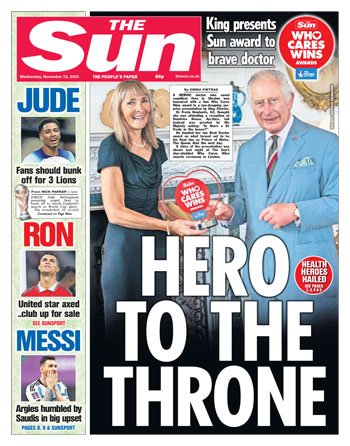
Centre stage belonged to Freda Newlands, an emergency doctor who had worked in crisis-hit areas around the world, including two months in Ukraine. She is photographed with the King, receiving a Who Cares Wins award. The awards, organised by the Sun, recognise health workers and most were handed out at a “glittering ceremony” (because they always are) on Monday night. No, the King didn’t go. He was busy with the South African president’s state visit. He had made the presentation in Scotland on the day before his mother died and a video was shown at this week’s event.
Hats off to the Sun for the awards programme and for getting top royals involved as well as the “host of stars” photographed on the second of two spreads yesterday. (Yes, Piers was there.)
The Sun is not alone in this sort of enterprise; the Mirror also plasters its Pride of Britain awards all over the front page. But do their big displays really celebrate the ‘heroes’? Or is it all just shameless self-promotion and virtue-signalling?
I’m old-fashioned. I like to see news on the front pages. Not self-aggrandisement dressed up as news – whether in the opinionated headlines of the whitetops or the schmaltzy ‘we really care’ stuff of the redtops. Yes, I applaud Dr Newlands for her efforts. Yes, I’d like to read about them – but in the five pages the Sun gave to its gongs yesterday, it managed only three sentences on what she actually did. And there was nothing on the other winners. Odd? The explanation comes at the foot of the first spread – they and their stories will be revealed when the event is televised by Channel 4 on Sunday. They are, according to the News UK website, partners in the enterprise, which is sponsored by the National Lottery.
So the paper doesn’t finance the awards that carry its name. Or have the right to report on them first. But it gets the good self-publicity.
I’m not sure if it’s me or the Sun that’s being cynical here.
Lack of front page variety
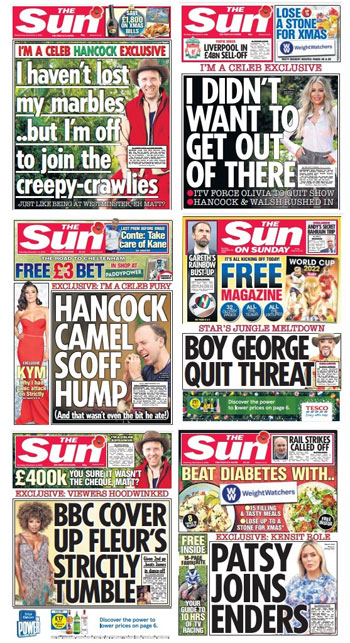
What else constitutes front-page ‘news’ for the Sun? A tax-raising budget, perhaps? Or a bomb killing people in Poland that could have dragged Nato into the Ukraine war?
It’s all a bit grim. You can’t blame editors for wanting to lighten the mood for readers wondering how they’re going to pay their electricity bills. A pretty face or a familiar name are more enticing.
That hero cover yesterday was the first this month not to be celeb-oriented. There have been nine about footballers, six I’m a Celebrity splashes and three more about television shows – Strictly, the Crown and EastEnders.
The remaining two had Jennifer Aniston talking about IVF and Ferne McCann, host of a programme called First Time Mum, coming under fire for remarks she made about the victim of an acid attack.
Those last two could be said to raise genuine issues and there were certainly some strong angles in the football clutch.
But there is a world beyond the TV screen and the football stadium.
Killed by mould
As you’d expect, the missile strike in Poland made the splash for what used to be considered the ‘heavies’: Times, Telegraph, Guardian and online Independent. Plus the Mirror and Metro (a very good front page). It was also a puff for the Express – the paper that surprised and pleased me the most that day.
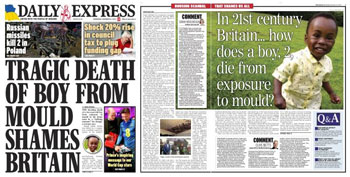
For its splash was the death, caused by a mouldy house, of two-year-old Awaab Ishak in Rochdale. It also gave the story an early spread and made it the subject of its top leader. This in a paper generally more concerned about pensioners in the south than toddlers in the North West. Excellent call.
The Sun, as we have seen, was busy with Ronaldo. The Mail regarded neither bombs in Poland nor little boys being killed by the damp in their homes as sufficiently important to warrant a mention on the front. That was filled with yet another attack on ‘woke’ universities, a huge puff for a Mail writer who fancies Matt Hancock and a Black Friday promotion that valued the paper at just a penny – an offer that hasn’t exactly gone down well with newsagents. They need to get out more.
Over-reliance on betting firms
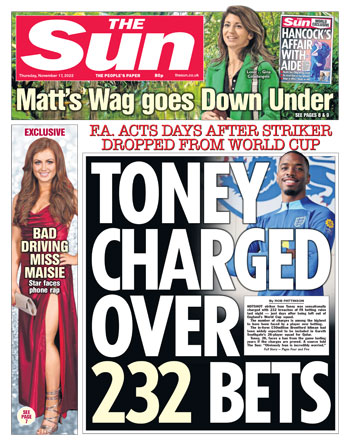
Back to the Sun. One of its stronger football splashes was the Brentford striker Ivan Toney being charged by the FA with more than 200 betting offences – a record number. This is not a match-fixing scandal, rather a case of a player accused of breaking the rules on gambling on the game.
Yesterday, the Times led on a surge in ‘suicidal gambling addicts’ turning up at A&E. NHS gambling clinics are, it continues, full of ‘young men in football shirts’ who have fallen foul of ‘predatory tactics’ by betting firms, including a boom in addictive ‘in-play’ sports betting.
Demand for these clinics has risen by almost half over the past year and doctors are said to be asking bookmakers to think of the human cost behind their profits, while the NHS picks up the bill.
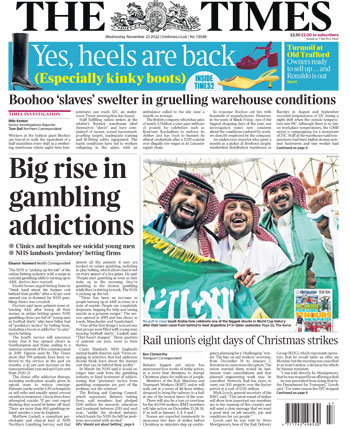
Gambling ruins lives. The deregulation of the industry started by Tony Blair’s government – including its come-to-nothing plans for supercasinos – has, IMHO, made matters worse.
But sport depends on it. And so do newspapers. Look at the commercials at breaks in television football coverage, look at the boards around the edge of pitches, look at the sports pages. No one but betting firms advertises on the sports pages. Absolutely no one. And then look at the ‘free bet’ puffs and the ads at the foot of usually naked front pages when there’s a big match or race meeting.
News UK even launched its own betting scheme with Sunbets – though that died in 2018.
To read the Sun write about Toney or the Times write about a rise in addiction is like seeing an arsonist returning to the blaze he started to watch the fire brigade in action.
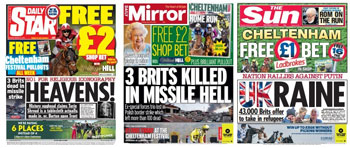
The not-so-British Bake Off
That Sun mini-audit shows a lot of interest in the jungle. Well, of course. Matt Hancock is, I think, hanging in there and he certainly brought the franchise a bit of extra publicity. The whole of Fleet Street is keeping a watching brief, which puts it in tune with the public. The Mail reported last Wednesday that I’m a Celebrity was the most watched programme on any network in the first week of November, with 12.3m viewers.
The Mail isn’t in the habit of reporting viewing figures as a page lead, but the attraction this time was the fact that Netflix didn’t have a show in the top 50. Then again, that was before the current series of the Crown had started.
Second and third place went to Strictly, with 9.9m for the Saturday outing and 8.8m for the results show. Then came Bake-Off, with 7.4m.
We’re clearly addicted not only to gambling but to reality TV shows. And Bake-Off obviously still has a following. I was intrigued, therefore, by the coverage of the final last week. Or rather lack of it.
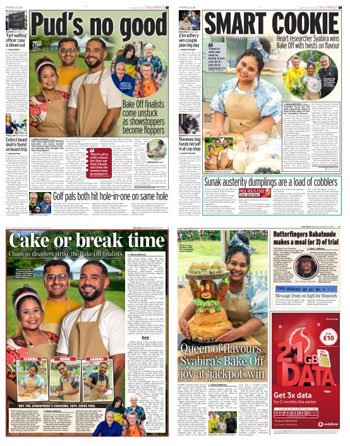
Back in the heyday, the winner’s face would be on the front, if only as a puff, and there’d be a full story inside. Not any more. Only the Mirror and the Express stuck to the old formula – a big preview piece on the day (page 3 in the case of the Express) and another page lead on the result. The Guardian and Times made the final a page lead, but in review format, while the i and Mail pushed it back to the ‘Last night’s TV’ slot. Metro and the Star made it a nib. Neither the Sun nor the Telegraph reported the result.
I would really, really like to feel confident that the lack of interest was completely unconnected to the fact that all three finalists – indeed the last four in the tent – were immigrants.
A point not lost on Stuart Jeffries, who wrote in the Guardian: “I'm not saying that every week, Bake Off’s kindly and diverse drama unwittingly stood against the home secretary's disgraceful, cruel immigration policy with the doughty pride of a sponge orangutan holding up a rainforest made from inverted meringue kisses. Oh hold on, I am.”
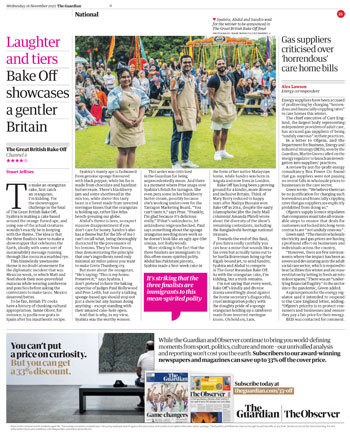
Front page of the fortnight
After all that I said…
But if you’re going to do it, do it well. And the Mirror did.
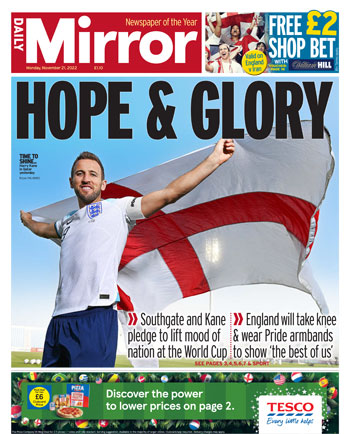
Liz Gerard’s Notebook is a fortnightly column published in the InPubWeekly newsletter. To be added to the mailing list, enter your email address here.












